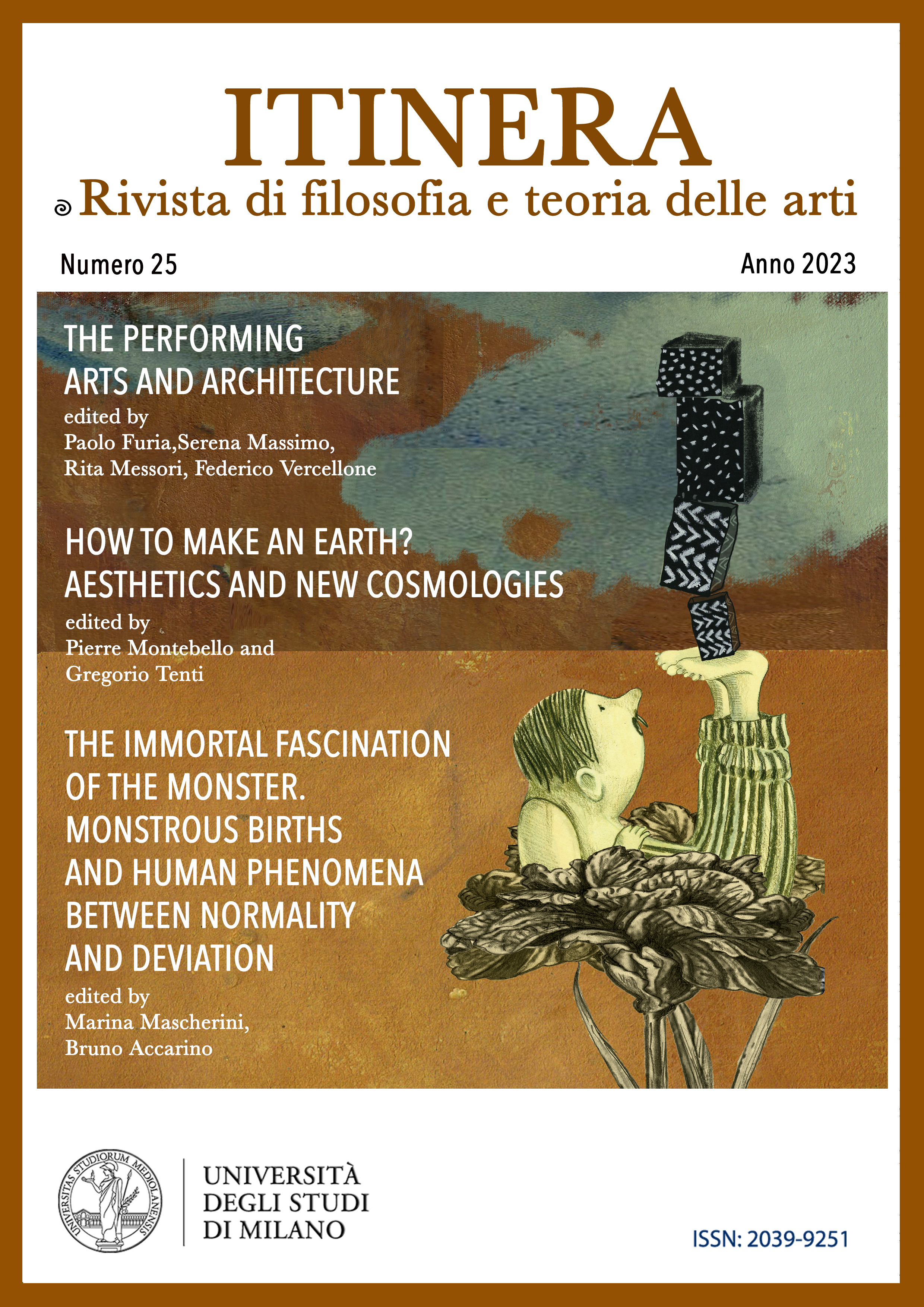Zu einer Ästhetik der Schwelle. Philosophische Reflexionen am Beispiel vom Musiktheater im Revier
DOI:
https://doi.org/10.54103/2039-9251/20806Parole chiave:
Threshold, Play, Sensibility, Verfransung.Abstract
The essay develops an aesthetic of the threshold from an analysis of the artistic collaboration between Werner Ruhnau and Yves Klein for the realisation of the Musiktheater im Revier in Gelsenkirchen. The threshold is a figure of thought that stands for the artistic choice to create zones of interaction between work and spectator, in which exchanges of roles and production of meaning take place. The aesthetics of the threshold in Ruhnau manifests itself through the architectural design of playful theatrical spaces in which the theatre audience can stage new identities. In Klein, the threshold becomes a meditative space, through which the subject trains his faculties of feeling and making sense. In the “Verfransung” (Adorno) between the strategies of Ruhnau and Klein, the theatre becomes the threshold for an interaction between public space and sensibility.
Downloads
Riferimenti bibliografici
Literaturverzeichnis
Adorno, Th. W., Die Kunst und die Künste [1967], in Id., Gesammelte Schriften, Bd. 10.1, hrsg. v. R. Tiedemann u. H. Schweppenhäuser, Suhrkamp, Frankfurt a.M. 1997, pp. 432-453.
Baecker, D., Die Dekonstruktion der Schachtel. Innen und außen in der Architektur, in D. Baecker, Niklas Luhmann u. Frederick Bunsen (hrsg. v.) Unbeobachtbare Welt. Über Kunst und Architektur, Haux, Bielefeld 1990, pp. 67-104.
Benjamin, Walter, Das Passagen-Werk, in Id., Gesammelte Schriften, Bd. 5.1, htsg. v. R. Tiedemann, Suhrkamp, Frankfurt a. M. 1991, pp. 9-1063.
Bockemühl, M. u. Hesse, M., Das Gelsenkirchener Musiktheater und die Blauen Reliefs von Yves Klein, tertium, Essen 1995.
Busch, K., Passivität, Textem, Lüneburg 2012.
Fleck, R., Yves Klein. L’aventure allemande, Manuella, Paris 2018.
Huizinga, J., Homo ludens. Vom Ursprung der Kultur im Spiel, Rowohlt, Hamburg 2015.
Klein, Y., Le dépassement de la problématique de l’art et autres écrits, Beaux-arts de Paris, Paris 2011.
Lyotard, J.-F., Das Inhumane. Plaudereien über die Zeit, übers. v. C. Pries, Passagen, Wien 20144.
Nietzsche, F., Die fröhliche Wissenschaft [Aphorismus 279], in Id., Kritische Studienausgabe, Bd. 3, hrsg. v. G. Colli u. M. Montinari, dtv, München-Berlin-New York 1988, pp. 343-651.
Jauss, H. R., Ästhetische Erfahrung und literarische Hermeneutik, Suhrkamp, Frankfurt a. M. 1991.
Schwarte, L., Philosophie der Architektur, Fink, München 2009.
Stachelhaus, H. (hrsg. v.), Yves Klein/Werner Ruhnau, Bongers, Recklinghausen 1976.
Stadt Gelsenkirchen, M:AI u. Lehmann-Kopp, D. (Hg.), Werner Ruhnau: Der Raum, das Spiel und die Künste, Jovis, Berlin 2007.
Stich, S., Yves Klein, Hatje Cantz, Ostfildern 1994.
Weitemeier, H., Yves Klein, Taschen, Köln 2016.
Onlinequellen
https://o-ton.online/Alt/seiten/backstage/musiktheater_im_revier.htm
Dowloads
Pubblicato
Come citare
Fascicolo
Sezione
Licenza
Copyright (c) 2023 Luca Viglialoro

Questo lavoro è fornito con la licenza Creative Commons Attribuzione - Condividi allo stesso modo 4.0.
Gli autori che pubblicano su questa rivista accettano le seguenti condizioni:
1. Gli autori mantengono i diritti sulla loro opera e cedono alla rivista il diritto di prima pubblicazione dell'opera, contemporaneamente licenziata sotto una Licenza Creative Commons - Attribuzione - Condividi allo stesso modo 4.0 internazionale che permette ad altri di condividere l'opera indicando la paternità intellettuale e la prima pubblicazione su questa rivista.
2. Gli autori possono aderire ad altri accordi di licenza non esclusiva per la distribuzione della versione dell'opera pubblicata (es. depositarla in un archivio istituzionale o pubblicarla in una monografia), a patto di indicare che la prima pubblicazione è avvenuta su questa rivista.
3. Gli autori possono diffondere la loro opera online (es. in repository istituzionali o nel loro sito web) prima e durante il processo di submission, poiché può portare a scambi produttivi e aumentare le citazioni dell'opera pubblicata (Vedi The Effect of Open Access).





